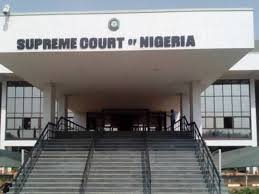…..dismisses suit by Kogi, 18 other states
The Supreme Court, on Friday, declined to declare the operations of the Economic and Financial Crimes Commission, EFCC, and two other anti-corruption agencies that were created by the Federal Government illegal.
In a unanimous decision, a seven-man panel of the apex court, led by Uwani Abba-Aji, dismissed the suit that 19 states filed to query the legal validity of the process that led to the establishment of the anti-graft agency in 2002.
According to the court, the EFCC Establishment Act did not require any form of ratification by the Houses of Assembly of the 36 states of the federation since it was not a treaty but a convention.
“A convention would have been ratified by member states, and the National Assembly can make laws from it, which will be binding on all the states in Nigeria as it is in the case of EFCC Establishment Act.
“In a country like Nigeria, the federating units do not have absolute power. The NFIU guideline is to present a benchmark and not to control the funds.
“Where an act of law is made by NASS like the NFIU and its guidelines, it is binding on all. Any act that has been competently enacted by the NASS cannot be said to be inconsistent.
“Where the NASS has enacted several laws on corruption, money laundering, etc., no state has the right to make law to compete with them. The investigative power of the EFCC cannot be said to be in conflict with legislative powers of the state assembly.
“I must agree with the AGF that the plaintiffs’ argument, that is, the Houses of Assembly of the plaintiffs’ states, is not tenable in law,” the Supreme Court added.
It, therefore, resolved all the issues against the states.
It will be recalled that the EFCC was established by an Act of the National Assembly on December 12, 2002, by the then administration of former President Olusegun Obasanjo.
Following the appointment and confirmation of its pioneer Executive Chairman, Mallam Nuhu Ribadu, and other administrative officers by the Senate, the Commission commenced its operational activities on April 13, 2003, though its Establishment Act was later amended in 2004.
However, in the suit before the apex court, the states, through their respective Attorneys General, argued that Section 12 of the 1999 Constitution, as amended, was not complied with before the EFCC began its operations.
According to the plaintiffs, it was a mandatory provision of the Constitution that the majority of the Houses of Assembly of States must vote and agree to the passage of the EFCC Act, insisting that it was not something that only the National Assembly was legally allowed to do.
They told the Supreme Court that none of the states was carried along before the EFCC was established by the then President Obasanjo’s administration.
They argued that the Supreme Court had, in a decided case-law in Dr. Joseph Nwobike vs. Federal Republic of Nigeria, held that it was a United Nations Convention against corruption that was reduced into the EFCC Establishment Act and that in enacting this law in 2004, the provision of Section 12 of the 1999 Constitution, as amended, was not followed.
The plaintiffs maintained that since due process was not followed before the EFCC Establishment Act was enacted, it cannot be applicable in states that never approved of it, in accordance with provisions of the 1999 Constitution, as amended.
They argued that any agency that was formed as a result of the Act ought to be regarded as an illegal institution.
The states relied on the fact that since the 1999 Constitution, as amended, is the supreme law of the land, any Act of the National Assembly that is inconsistent with the constitution ought to be declared a nullity.
The two other agencies the states also challenged their legitimacy, were the Independent Corrupt Practices and other Related Offences Commission, ICPC, and the Nigerian Financial Intelligence Unit, NFIU.
Even though the suit, marked: SC/CV/178/2023, was originally brought before the court by Kogi State, however, some states applied and were joined as co-plaintiffs while others filed applications for their own suit to be consolidated with the matter.
The Federal Government had on October 22, when the parties adopted their briefs of argument, urged the apex court to dismiss the suit for want of merit.
FG, which was represented by the Attorney-General of the Federation and Minister of Justice, Prince Lateef Fagbemi, SAN, challenged the competence of the legal action, which it described as a threat to the ongoing fight against corruption and financial crimes in the country.
The AGF maintained that contrary to the contention of the states, the EFCC was validly established in line with the provision of Section 15(5) of the 1999 Constitution, as amended.
Fagbemi, SAN, equally refuted the claim of the plaintiffs that the Act that established the EFCC was an offshoot of an international convention that was not properly domesticated in Nigeria.

